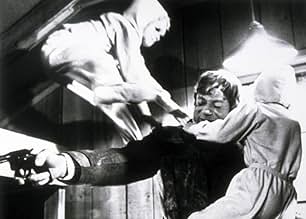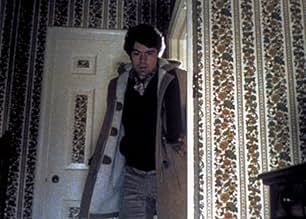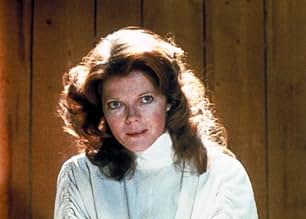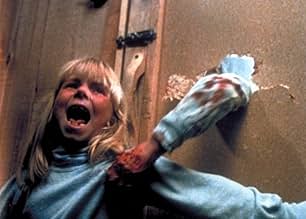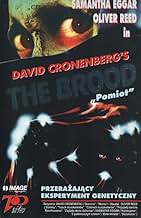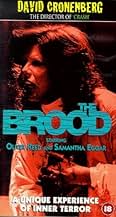Un uomo cerca di scoprire le tecniche terapeutiche di uno psicologo non convenzionale sulla moglie istituzionalizzata, in mezzo a una serie di brutali omicidi.Un uomo cerca di scoprire le tecniche terapeutiche di uno psicologo non convenzionale sulla moglie istituzionalizzata, in mezzo a una serie di brutali omicidi.Un uomo cerca di scoprire le tecniche terapeutiche di uno psicologo non convenzionale sulla moglie istituzionalizzata, in mezzo a una serie di brutali omicidi.
- Regia
- Sceneggiatura
- Star
- Premi
- 1 vittoria e 5 candidature totali
Robert A. Silverman
- Jan Hartog
- (as Robert Silverman)
Recensioni in evidenza
Although I have watched David Cronenberg's "The Brood" a number of times, I still find it unbelievably disturbing. From the beginning until the ending credits, it is unsettling horror at its morbid best.
Under the care of Dr. Hal Raglan (Oliver Reed), Nola Carveth (Samantha Eggar) is undergoing a radical and controversial form of psychiatric treatment called "Psychoplasmics". Psychoplasmics takes the role-playing of psychotherapy to a new level by training the patient to release his pent-up rage and physically expel that rage from his body. Sounds weird? That is only the beginning. Frank Carveth (Art Hindle) is Nola's estranged husband who suspects his wife of physically abusing their daughter Candace. After vowing to protect his daughter legally, murders committed by strange deformed children begin to occur.
To say anymore would be to stifle The Brood's terror-ific mystique. However, I will suggest that you consider experiencing this film on an empty stomach with the lights on. After viewing, don't be surprised if you feel compelled to make amends with anyone you might currently be at odds with.
Under the care of Dr. Hal Raglan (Oliver Reed), Nola Carveth (Samantha Eggar) is undergoing a radical and controversial form of psychiatric treatment called "Psychoplasmics". Psychoplasmics takes the role-playing of psychotherapy to a new level by training the patient to release his pent-up rage and physically expel that rage from his body. Sounds weird? That is only the beginning. Frank Carveth (Art Hindle) is Nola's estranged husband who suspects his wife of physically abusing their daughter Candace. After vowing to protect his daughter legally, murders committed by strange deformed children begin to occur.
To say anymore would be to stifle The Brood's terror-ific mystique. However, I will suggest that you consider experiencing this film on an empty stomach with the lights on. After viewing, don't be surprised if you feel compelled to make amends with anyone you might currently be at odds with.
David Cronenberg plainly still carried a lot of baggage about the opposite sex when he embarked on his final film of the seventies. Described as "ludicrous" by David Shipman and designated a 'BOMB!' by Leonard Martin, which makes it sound a lot more fun it actually proves to be. A large cast never really mesh as they just mill about and talk and talk before coming to gory ends committed by ugly little trolls in bright red anoraks. Oliver Reed somehow keeps a straight face as a seriously crazy psychiatrist while it's fun to hear Samantha Eggar talking like a little girl under the influence of regression therapy.
Nola Carveth is a patient at the Somafree Institute under the care of Dr. Hal Raglan, a leader in an experimental form of therapy known as 'psychoplasmics.' Frank is Nola's estranged husband, who is battling for custody of their child Candice. Nola gets angry and her mental illness makes her unstable around the child. Meanwhile, a strange series of gruesome murders begins, with the victims all knowing the Carveths well. Deciding to learn more about Dr. Raglan and psychoplasmics himself, Frank begins to investigate, finding himself at the center of a mystery that will change his life irrevocably, in David Cronenberg's 'The Brood.'
'The Brood' is full of the blood, body horror and disturbing images that one would expect of a Cronenberg venture. It is tense and brimming with macabre thrills, chills and unsettling scenes. That is not to say the film is without dramatic or intellectual power, because 'The Brood' has more to offer than your average wild and weird horror. A comment about the effects of child-abuse and mental illness in conjunction with parenting and guardianship is being made through Cronenberg's partially autobiographical screenplay, one that is slightly obscured by the violence around it.
Although the murders add another dimension to the story, they take away from the atmosphere of quiet intrigue surrounding Raglan, the Carveths and the Institute; as well as diminish the power of the aforementioned subtle commentary about mental health and abuse. While they serve a purpose and are important to the plot, something a little less sensationalist would have been more in keeping with the eerie tone established early on in the film. In short, the psychological horror elements are fantastic, while the elements of physical horror seem lacking- or even rudimentary- in comparison.
Less rudimentary is Mark Irwin's cinematography, which is striking and stylish work. The pairing of Cronenberg and Irwin is like that of David Lynch and Frederick Elmes: a fruitful partnership with artistic leanings that has resulted in some visually stunning movies. 'The Brood' is a cold and beautiful looking film, with Irwin's use of space and his chosen composition being especially significant. He and Cronenberg made six films together; each one is texturally rich, undeniably impressive and memorable in terms of visuals.
As in most Cronenberg flicks, special effects and make-up is of tremendous importance to 'The Brood,' and Allan Cotter's work does not disappoint. He creates such disturbing, pulsating creatures and attachments that one with a weak stomach may want to forgo the film entirely. His work is on show primarily in the latter half of the film and will leave an indelible impression on the viewer- for better and for worse.
Composer Howard Shore has worked on sixteen Cronenberg films, with 'The Brood' being his first and 2022's 'Crimes of the Future' being the most recent. Shore's work in 'The Brood' is eerie and evocative, though often mournful and mysterious. It is music that helps inform scenes of tone, but never in an overly grandiose manner. For the film, Shore has created subtle, melodically pleasing compositions that linger in the mind long after the credits have gone up and the cinema is empty.
The performances from the cast are also memorable and strong, with Oliver Reed particularly impressing as Dr. Raglan. Reed had a screen presence like no other, with his remarkable calm and brooding intensity, he instantly draws the eye and keeps its' attention. Due to his reputation as a hellraiser, he received relatively few interesting roles or films from the mid-70's onward, and the ones he chose to do generally wasted his immense talents. Cronenberg doesn't let Reed's skills go to waste, and the actor turns in a powerful, reserved performance that will be remembered fondly by any who see the film.
Art Hindle and Samantha Eggar star as Frank and Nola, facsimiles of Cronenberg and his first wife Margaret Hindson. Both deliver strong performances, though Hindle fades into the background somewhat; one gets the feeling that many other actors could have played that part. Not so with Eggar, she is intensely assured and captivating, making Nola the epitome of the unhinged housewife. She is like a black panther on a moonless night, alluring, understated and unquestionably deadly. It is a fine performance of no vanity that'll be remembered and appreciated for as long as cinema lasts.
'The Brood' is a strange, intense horror that contains delicacies of an intellectual and of a visceral kind. Featuring gory scenes and body horror a-plenty, it also explores the topics of mental health and abuse in an informed and measured way. Cronenberg's direction and screenwriting is impressive, while he makes the most of talented actors like Oliver Reed and Samantha Eggar; extracting from them fine, subdued and deeply affecting performances. While it is not perfect, 'The Brood' is an interesting, entertaining film that offers a lot more than your average slasher. If you like your movies on the dark side; it's one you're going to love.
'The Brood' is full of the blood, body horror and disturbing images that one would expect of a Cronenberg venture. It is tense and brimming with macabre thrills, chills and unsettling scenes. That is not to say the film is without dramatic or intellectual power, because 'The Brood' has more to offer than your average wild and weird horror. A comment about the effects of child-abuse and mental illness in conjunction with parenting and guardianship is being made through Cronenberg's partially autobiographical screenplay, one that is slightly obscured by the violence around it.
Although the murders add another dimension to the story, they take away from the atmosphere of quiet intrigue surrounding Raglan, the Carveths and the Institute; as well as diminish the power of the aforementioned subtle commentary about mental health and abuse. While they serve a purpose and are important to the plot, something a little less sensationalist would have been more in keeping with the eerie tone established early on in the film. In short, the psychological horror elements are fantastic, while the elements of physical horror seem lacking- or even rudimentary- in comparison.
Less rudimentary is Mark Irwin's cinematography, which is striking and stylish work. The pairing of Cronenberg and Irwin is like that of David Lynch and Frederick Elmes: a fruitful partnership with artistic leanings that has resulted in some visually stunning movies. 'The Brood' is a cold and beautiful looking film, with Irwin's use of space and his chosen composition being especially significant. He and Cronenberg made six films together; each one is texturally rich, undeniably impressive and memorable in terms of visuals.
As in most Cronenberg flicks, special effects and make-up is of tremendous importance to 'The Brood,' and Allan Cotter's work does not disappoint. He creates such disturbing, pulsating creatures and attachments that one with a weak stomach may want to forgo the film entirely. His work is on show primarily in the latter half of the film and will leave an indelible impression on the viewer- for better and for worse.
Composer Howard Shore has worked on sixteen Cronenberg films, with 'The Brood' being his first and 2022's 'Crimes of the Future' being the most recent. Shore's work in 'The Brood' is eerie and evocative, though often mournful and mysterious. It is music that helps inform scenes of tone, but never in an overly grandiose manner. For the film, Shore has created subtle, melodically pleasing compositions that linger in the mind long after the credits have gone up and the cinema is empty.
The performances from the cast are also memorable and strong, with Oliver Reed particularly impressing as Dr. Raglan. Reed had a screen presence like no other, with his remarkable calm and brooding intensity, he instantly draws the eye and keeps its' attention. Due to his reputation as a hellraiser, he received relatively few interesting roles or films from the mid-70's onward, and the ones he chose to do generally wasted his immense talents. Cronenberg doesn't let Reed's skills go to waste, and the actor turns in a powerful, reserved performance that will be remembered fondly by any who see the film.
Art Hindle and Samantha Eggar star as Frank and Nola, facsimiles of Cronenberg and his first wife Margaret Hindson. Both deliver strong performances, though Hindle fades into the background somewhat; one gets the feeling that many other actors could have played that part. Not so with Eggar, she is intensely assured and captivating, making Nola the epitome of the unhinged housewife. She is like a black panther on a moonless night, alluring, understated and unquestionably deadly. It is a fine performance of no vanity that'll be remembered and appreciated for as long as cinema lasts.
'The Brood' is a strange, intense horror that contains delicacies of an intellectual and of a visceral kind. Featuring gory scenes and body horror a-plenty, it also explores the topics of mental health and abuse in an informed and measured way. Cronenberg's direction and screenwriting is impressive, while he makes the most of talented actors like Oliver Reed and Samantha Eggar; extracting from them fine, subdued and deeply affecting performances. While it is not perfect, 'The Brood' is an interesting, entertaining film that offers a lot more than your average slasher. If you like your movies on the dark side; it's one you're going to love.
I really enjoyed David Cronenberg's film called The Brood. It is about a woman who is being cared for by an eccentric psychologist called Dr. Raglan(Oliver Reed). Who uses theatrical techniques to breach the psychological blocks in his patients. When their six year old daughter comes back from a visit with her mother and is covered with bruises the father Frank Carveth attempts to stop his his wife from seeing their daughter. But the psychologist Dr. Raskin will not stop his wife from seeing the girl. whilst this is happening his daughter's teacher is is attacked by two strange looking deformed children. Her father starts to believe that it is to do with Dr. Rankin and a psychotherapy cult which he may have something to do with it. This film was quite disturbing at times. I thought that Oliver Reed played a very good part in the film.
David Cronenberg has always possessed a flair for unique and disturbing visions infused with the trimmings of a genre that can be best referred to as "biohorror." "The Brood," his tale of hideous mutant children who do the bidding of mentally disturbed Nola (Samantha Eggar) under the care of new-wave psychiatrist Dr. Raglan (Oliver Reed, with a quietly sophisticated Peter Cushing sensibility), is buffered by fine performances that veer away from camp. In a way, one of Cronenberg's achievements is writing such outlandish material and making it entirely convincing and visceral, as opposed to merely settling on B-movie cheesiness, which I admire. As is the case with most Cronenberg films, here 'reality' is made the most atypical place where man can reside, and the clever script is always one careful step ahead of the audience.
7/10
7/10
Lo sapevi?
- QuizDavid Cronenberg wrote the film following the tumultuous divorce and child-custody battle he waged against Margaret Hindson. Cronenberg also said that Samantha Eggar's character, Nola Carveth, possessed some of the characteristics of his ex-wife.
- BlooperJust after the first murder, the deformed/mutant child who committed it leaves very large, bloody handprints on the stair railing just near the dead body. These handprints are never mentioned again, in particular by the police, who insist later that they were "never looking for anything that small." It would have been impossible to miss these handprints at the crime scene, and such child-sized handprints would have certainly tipped off the police in a different direction upon discovery.
- Citazioni
Juliana Kelly: Thirty seconds after you're born you have a past and sixty seconds after that you begin to lie to yourself about it.
- Curiosità sui creditiSpecial thanks to Dr. Denton: Sleepware.
- Versioni alternativeThe 2005 R2 UK DVD by Anchor Bay, features the 92min Unrated Cut (in addition to the 88min UK edited cut). This is the first time the Unrated Cut has been released in the UK on a home entertainment format, and includes an additional 28 seconds of footage from the ripping and licking of the foetus, the mallet murder of the old lady and shots of the dead schoolteacher's battered face.
I più visti
Accedi per valutare e creare un elenco di titoli salvati per ottenere consigli personalizzati
Dettagli
- Data di uscita
- Paese di origine
- Lingua
- Celebre anche come
- Los engendros del diablo
- Luoghi delle riprese
- Aziende produttrici
- Vedi altri crediti dell’azienda su IMDbPro
Botteghino
- Budget
- 1.400.000 CA$ (previsto)
Contribuisci a questa pagina
Suggerisci una modifica o aggiungi i contenuti mancanti

Divario superiore
By what name was Brood - La covata malefica (1979) officially released in India in English?
Rispondi

